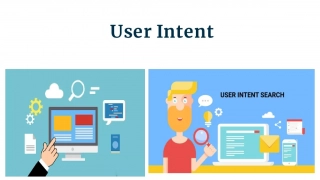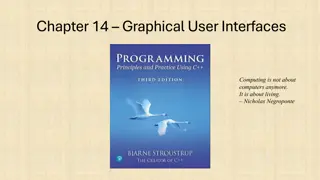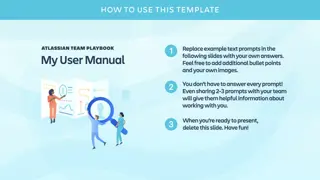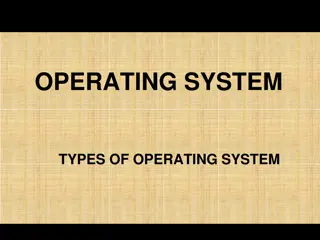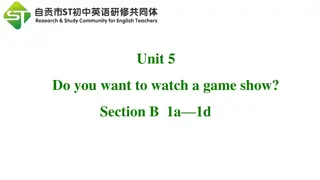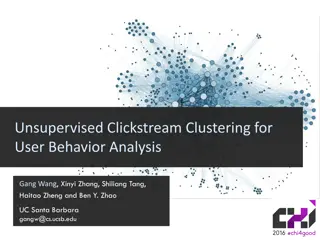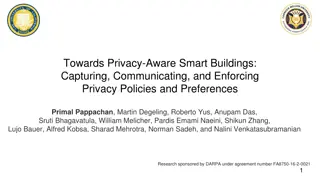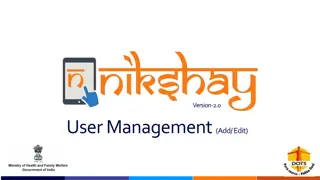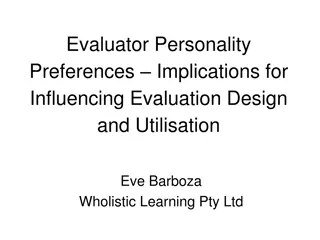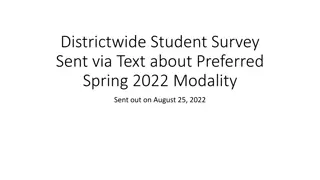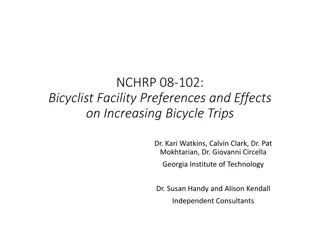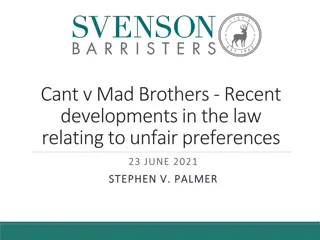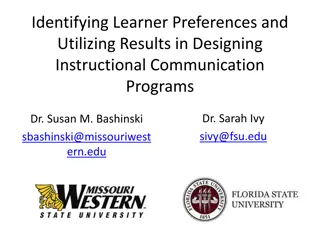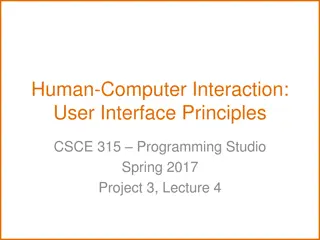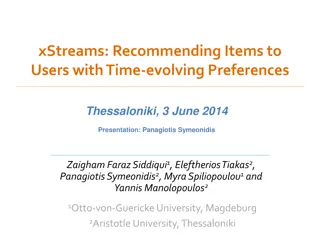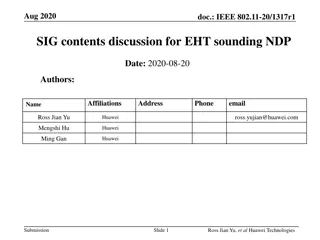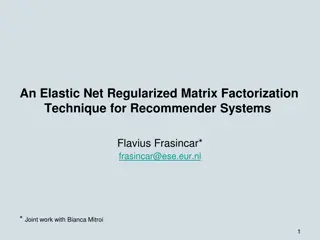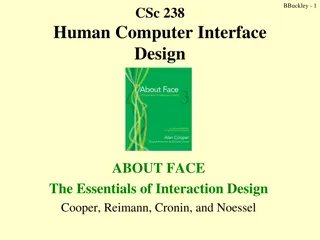Maximizing Impact: The Role of Rich Snippets in SERPs"User Intent
User intent, also known as search intent, refers to the underlying goal or purpose a user has when performing an online search. It goes beyond the literal interpretation of keywords and focuses on understanding why a person is searching. Recognizing and catering to user intent is crucial for creatin
3 views • 10 slides
Deep Reinforcement Learning for Mobile App Prediction
This research focuses on a system, known as ATPP, based on deep marked temporal point processes, designed for predicting mobile app usage patterns. By leveraging deep reinforcement learning frameworks and context-aware modules, the system aims to predict the next app a user will open, along with its
0 views • 24 slides
Operating Systems
An operating system is a crucial program that manages all other programs on a computer. It handles tasks like input recognition, file management, and device control. There are different types of operating systems such as single-user, single-task systems, multi-user, multi-task systems, real-time ope
6 views • 11 slides
The Evolution of Graphical User Interfaces in Computing
Graphical User Interfaces (GUIs) have transformed computing into a more user-friendly and interactive experience, emphasizing the shift from technology-focused to human-centric living. This chapter delves into the various aspects of GUIs, including I/O alternatives, common GUI tasks, programming per
1 views • 32 slides
Gender Responsive Crop Breeding: Plantain Preferences in Cameroon
Plantains are a significant crop in Cameroon, with a focus on understanding gender preferences for plantain traits. Research conducted in two regions revealed insights on the importance of plantains, decision-making dynamics, and gender-specific preferences. Men exhibited more independence in decisi
0 views • 10 slides
Understanding Linux User Capabilities and Namespace Management
Linux user namespaces and capabilities play a critical role in managing system security and permissions. Users and groups are assigned unique IDs, and processes are associated with the user's ID. The kernel enforces permission checks based on user IDs and group IDs, allowing root access to bypass ce
0 views • 14 slides
User Personal Preferences and Work Style Guidelines
Establish clear communication on preferred working conditions, desired feedback methods, availability, and communication preferences. Highlight the importance of timely feedback, space for reflection, and structured work hours. Encourage open dialogue and respect for individual work styles.
1 views • 16 slides
Understanding Different Types of Recommender Systems
Recommender systems play a crucial role in providing personalized recommendations to users. This article delves into various types of recommender systems including Collaborative Filtering, Content-Based, Knowledge-Based, and Group Recommender Systems. Collaborative Filtering involves making predicti
0 views • 7 slides
Understanding Heuristic Evaluation in User Interface Design
Heuristic evaluation is an analytical method where experts evaluate interfaces based on usability principles. This evaluation helps in identifying potential design issues that may impact user satisfaction. The process involves a small group of evaluators reviewing the interface against a set of reco
5 views • 12 slides
Understanding Different Types of Operating Systems
An operating system is the crucial program that manages a computer's resources and acts as an interface between the user and the machine. Various types of operating systems exist, including real-time, multi-user vs. single-user, multi-tasking vs. single-tasking, distributed, and embedded systems. Re
1 views • 11 slides
Implementing Alert Messages and User Input Handling in Java
This tutorial guides you through creating alert messages, handling user input, defining functions, calling functions from the `onCreate` method, and creating an XML file for user data entry validation in Java. Learn how to display alerts for empty user credentials and process user actions accordingl
1 views • 6 slides
Exploring TV Shows and Movies Preferences
Engage in discussions about preferences for TV shows and movies, ranging from game shows to comedies, action movies to scary movies. Dive into opinions on educational content, seriousness, and enjoyability, and practice listening skills to understand others' viewpoints. Explore a variety of genres a
0 views • 13 slides
Insights into Secondary School Menu Preferences for Autumn-Winter 2020
Exploring the new student-led menu for secondary schools by Food Union in collaboration with Chartwells. Analyzing responses by region to understand why students are not eating at school, addressing issues like long queues and meal preferences. Identifying common food concepts and preferences across
0 views • 22 slides
Unsupervised Clickstream Clustering for User Behavior Analysis
Understanding user behavior in online services is crucial for businesses. This research focuses on utilizing clickstream data to identify natural clusters of user behavior and extract meaningful insights at scale. By analyzing detailed user logs, the study aims to reveal hidden patterns in user inte
0 views • 19 slides
Privacy-Aware Smart Buildings: Ensuring Privacy Policies and Preferences
Smart buildings equipped with IoT technology raise concerns about privacy. This research explores capturing, communicating, and enforcing privacy policies and preferences in smart buildings, addressing issues like data collection, user preferences, and policy enforcement based on FTC and OECD guidel
0 views • 24 slides
Domain-Specific Visual Analytics Systems: Exploring Expert User Insights
This presentation delves into domain-specific visual analytics systems focusing on political simulation, wire fraud detection, bridge maintenance, and more. It emphasizes leveraging user expertise for effective system design and evaluation, highlighting the importance of user insights in data analys
0 views • 27 slides
Efficient User Management System for Health Facilities
Record and manage user details effectively with the new Version 2.0 User Management feature. RNTCP has now registered over 35,000 PHIs, 140,000 Private Health Facilities, 15,000 Private Labs, 31,000 Private Chemists, across 700 Districts and 8,000 TUs in Nikshay. Enhance operations by editing TU pro
0 views • 26 slides
Understanding Agile User Stories in Software Development
Agile user stories play a crucial role in software development by providing short descriptions of features desired by customers in a language they understand. This method allows for agile planning, efficient documentation, and effective communication between development teams and clients. Extracting
0 views • 30 slides
Understanding Evaluator Personality Preferences in Evaluation Practice
Explore how evaluator personality preferences can impact evaluation design and utilization, and how differences in preferences between evaluators and clients may explain controversies in evaluation practice. The interactive session delves into using personality preferences to inform evaluation desig
0 views • 38 slides
Enhancing User Experience Through Data Trails and Metrics
Andrea Thompson, a Sr. User Experience Manager at The Home Depot, highlights the importance of measuring and analyzing user experience metrics to understand and improve customer interactions. By investigating data trails from various touchpoints, such as customer sign-ups, interactions with associat
0 views • 17 slides
Student Preferences for Spring 2022 Instructional Modality Survey Results
A districtwide student survey was sent out via text to gather preferences for the preferred instructional modality for Spring 2022. The survey targeted currently enrolled SMCCCD students who opted-in to receive text messages, resulting in a 38% response rate. Preferences by primary campus showed var
0 views • 4 slides
Understanding Bicyclist Facility Preferences for Increasing Bicycle Trips
This research study aims to investigate the various preferences and effects of different bicycle facilities on increasing bicycle trips. It explores how individual preferences for bike facilities differ and the effectiveness of these facilities in attracting new trips. The study delves into the impa
0 views • 52 slides
Recent Developments in Unfair Preferences Law
The law on unfair preferences, particularly under Section 588FA of the Corporations Act, addresses transactions where a company favors a creditor, resulting in the creditor receiving more than they would in a winding up process. Recent cases like Cant v. Mad Brothers and Re Emanuel highlight the com
0 views • 27 slides
Collaborative Bayesian Filtering in Online Recommendation Systems
COBAFI: COLLABORATIVE BAYESIAN FILTERING is a model developed by Alex Beutel and collaborators to predict user preferences in online recommendation systems. The model aims to fit user ratings data, understand user behavior, and detect spam. It utilizes Bayesian probabilistic matrix factorization and
0 views • 49 slides
Community-Led Qualitative Research on LDSS/N Distribution Preferences
Dr. Annie Madden leads a community-led research project focused on the values and preferences of people who inject drugs regarding LDSS/N distribution. The study aims to generate evidence on the feasibility and impact of implementing LDSS/N distribution programs, involving phases from pre-implementa
0 views • 8 slides
Understanding Learner Preferences for Effective Communication Programs
Explore learner preferences and their role in designing instructional communication programs. Learn how to assess preferences, promote communication development, and build a strong foundation for effective programs. Discover key concepts such as behavior as communication and the importance of intent
0 views • 65 slides
User Interface Design Principles in Human-Computer Interaction
User interface design principles are crucial in Human-Computer Interaction. This content highlights key principles such as aesthetics, anticipation, autonomy, and color consideration for users with color blindness. It emphasizes the importance of user testing, user autonomy, and providing essential
0 views • 24 slides
Enhancing User Experience Through Dynamic Recommendations
In this presentation, the xStreams system is introduced for recommending items to users with changing preferences. The methodology involves learning user preferences, finding similar users, and providing item recommendations. The motivation behind the system includes dealing with vast amounts of dat
0 views • 27 slides
Understanding Interaction Design in Human-Computer Interaction
Interaction design focuses on creating interactive products that are easy, effective, and enjoyable to use. It aims to reduce negative user experiences while enhancing positive ones. Designing interactive products requires understanding user activities, interfaces, and device arrangements to support
0 views • 11 slides
Enhancing Recipe Recommendations with C-KGAT Model
Introducing the Contrastive Knowledge Graph Attention Network (C-KGAT) for personalized recipe recommendation, addressing user preferences and noise in interactions. The model leverages a collaborative knowledge graph, user-recipe interactions, and textual features to recommend top-K recipes to user
0 views • 21 slides
Engaging English Lesson on Sports Preferences
In this English lesson for Class Five students, the focus is on discussing sports preferences. The lesson introduces Tania, who enjoys various sports activities like swimming, cycling, and football. Students will learn how to engage in conversations about favorite sports, express likes and dislikes,
0 views • 18 slides
Understanding User Parameters in Sage ERP X3
Sage ERP X3 allows users to define specific parameters at the user level, overriding values set at the folder or company level. This feature enables customization of settings tailored to individual users, enhancing user experience and efficiency within the system. Explore the various user parameter
0 views • 11 slides
IEEE 802.11-20/1317r1 EHT-SIG Proposal Discussion
The document discusses EHT-SIG for single-user and sounding NDP in IEEE 802.11-20/1317r1, focusing on overflow bits, user fields, CRC, and tail formats. It covers the format details, subfields, and overhead compared to HE sounding, proposing specific bit allocations for different elements. The EHT-S
0 views • 16 slides
Exploring Doll Preferences Among Children in Kindergarten Library
In this educational activity, children are prompted to identify and label different types of dolls traditionally associated with specific genders, such as girls liking girl dolls and boys liking boy dolls. They engage in a hands-on task of matching names to dolls through drag-and-drop interactions.
0 views • 4 slides
Personalized Celebrity Video Search: Cross-space Mining Approach
This study presents a novel approach for personalized celebrity video search based on cross-space mining, aiming to match user interests with celebrity popularity. By learning the interest space of users and the popularity space of celebrities, the framework correlates the two spaces to enhance sear
0 views • 23 slides
Administrator Deletes User - User Management System Storyboard
An administrator navigates through a user list, selects a user for deletion, confirms the action, and successfully removes the user from the system. The process involves interacting with user details, confirming the deletion, and updating the user list accordingly in a structured manner.
0 views • 4 slides
Elastic Net Regularized Matrix Factorization for Recommender Systems
This research paper presents an elastic net regularized matrix factorization technique for recommender systems, focusing on reducing the dimensionality of the problem and utilizing features to describe item characteristics and user preferences. The approach combines existing algorithms and applies e
0 views • 27 slides
User Interface vs User Experience: Understanding the Essentials
Exploring the distinctions between User Interface (UI) and User Experience (UX) in human-computer interaction design. UI focuses on the space of interaction between humans and machines, while UX encompasses users' behavior, attitude, and emotions towards a product or service. The goal is to create i
0 views • 63 slides
Service Delivery Preferences Among Stable HIV Patients in Zambia
A study conducted in Zambia explored the service delivery preferences of stable patients on antiretroviral therapy (ART) through a discrete choice experiment. The research focused on the benefits of differentiated service delivery, gaps in knowledge regarding patient preferences, and demographic cha
0 views • 9 slides
Efficient Keyword-Aware Travel Route Recommendation System
This presentation discusses an efficient keyword-aware travel route recommendation system that leverages user-generated content and location-based social networks to provide diversified and representative travel routes. The system aims to address the challenge of restricting users to limited query o
0 views • 39 slides
